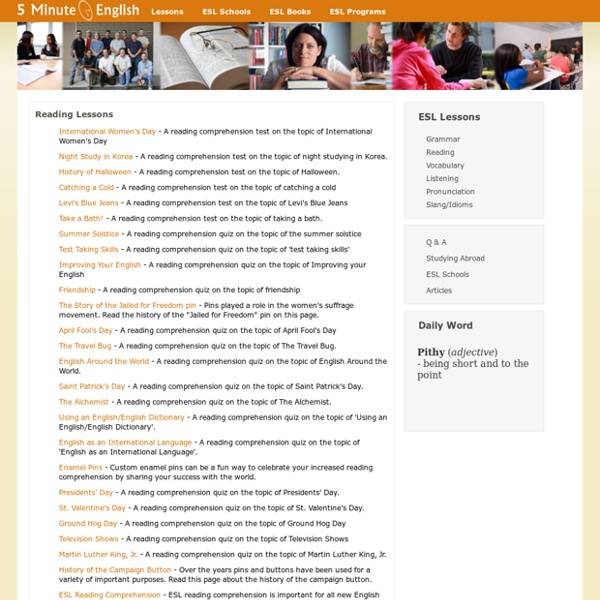25 Terrific Online Games for English Language Learners - Online College Courses
English language learners fall into two categories — native speakers and those pursuing it via ESL/EFL instruction (or self-instruction!). But both demographics can build up their skills, no matter their age or proficiency, through game-based learning. The Internet, in its infinite providence, does not disappoint when it comes to hosting effective resources for teaching and reviewing the core components of the English language. Here’s a few particularly useful games or, more accurately in most cases, suites of games. GameZone: Dozens of simple, straightforward games about grammar, spelling, and vocabulary reach out to English language learners at all levels.
Reading - Intermediate
Reading Comprehension - "Learning English" Read this short text about learning English, then answer the multiple-choice questions. Exercise Number: 3R1 The Alien Story Read this story about a credible UFO sighting - and then put the pieces of the story into the correct order. Exercise Number: 3R2 Changes In Town Read how Jake's town has changed recently, then answer true/false questions.
Activities for children
Each activity will help children practise at least one of the skills we test in our Cambridge English: Young Learners tests – reading and writing, listening or speaking. They also include words taken from the word lists used to create these exams. The activities are divided into levels taken from the Common European Framework of Reference for Languages (CEFR). As children move through the levels in this section, the activities will start to get more difficult. If you’re not sure what level your child is at, it may be a good idea to start with the pre-A1 level activities.
Continuing Studies at UVic
About the Study Zone The Study Zone is for students of the English Language Centre (ELC) at the University of Victoria. ELC teachers create the English language lessons and practice exercises.
Expressions for Agreeing and Disagreeing
This page is about words and phrases that we use when we agree or disagree with someone in English. Stating an opinion In my opinion...The way I see it...If you want my honest opinion....According to Lisa...As far as I'm concerned...If you ask me...
Reading Comprehension Worksheets
"Your reading comprehension materials are the best I've found on the web. They are so thorough and comprehensive! My students and I have learned a lot from them. Thanks so much!" -- Susan B., Carter, KY. 03/21/12 Like these materials?
35 fun classroom practice activities for Present Continuous (Present Progressive) - Articles
The simplest use of Present Continuous is to talk about things that are in some way in progress now/ presently/ currently/ at the moment, which is the main focus of this article. This use is often contrasted with Present Simple for present routines/ habits/ repeated actions. In normal communication, Present Continuous is perhaps more useful to talk about future arrangements such as meetings, dates and appointments, but this is so different from the basic meaning that there will be another article on that future use. There are a couple of activities in this article for the much rarer use of Present Continuous to talk about regular habits – often annoying ones – like “She’s always sucking her teeth”.
happy
English is a West Germanic language that was first spoken in early medieval England and is now a global lingua franca. Named after the Angles, one of the Germanic tribes that migrated to the area of Britain that would later take their name, England, both names ultimately deriving from the Anglia peninsula in the Baltic Sea. It is closely related to the Frisian languages, but its vocabulary has been significantly influenced by other Germanic languages, particularly Norse (a North Germanic language), as well as by Latin and French.[6] English has developed over the course of more than 1,400 years. The earliest forms of English, a set of Anglo-Frisian dialects brought to Great Britain by Anglo-Saxon settlers in the 5th century, are called Old English. Middle English began in the late 11th century with the Norman conquest of England and was a period in which the language was influenced by French.
800 Free eBooks for iPad, Kindle & Other Devices
Download 800 free eBooks to your Kindle, iPad/iPhone, computer, smart phone or ereader. Collection includes great works of fiction, non-fiction and poetry, including works by Asimov, Jane Austen, Philip K. Dick, F.



